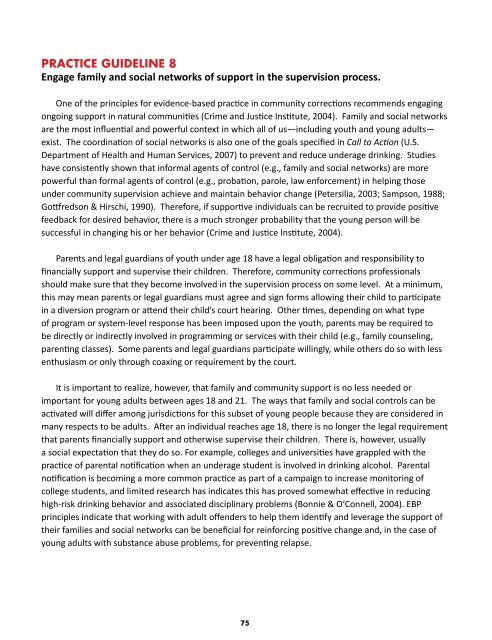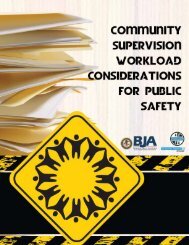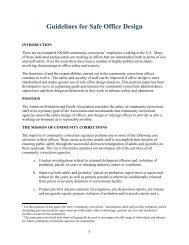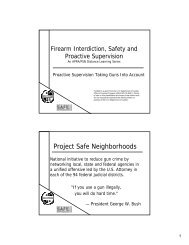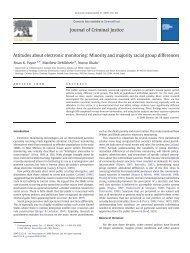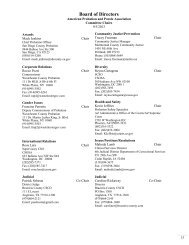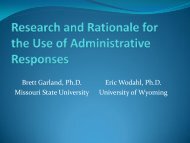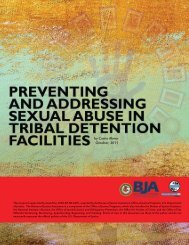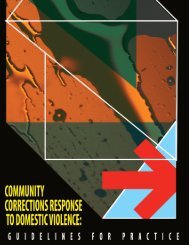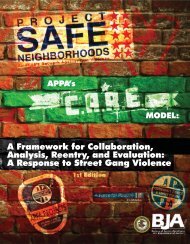Intervention Principles and Practice Guidelines for - Underage ...
Intervention Principles and Practice Guidelines for - Underage ...
Intervention Principles and Practice Guidelines for - Underage ...
You also want an ePaper? Increase the reach of your titles
YUMPU automatically turns print PDFs into web optimized ePapers that Google loves.
<strong>Practice</strong> Guideline 8<br />
Engage family <strong>and</strong> social networks of support in the supervision process.<br />
One of the principles <strong>for</strong> evidence-based practice in community corrections recommends engaging<br />
ongoing support in natural communities (Crime <strong>and</strong> Justice Institute, 2004). Family <strong>and</strong> social networks<br />
are the most influential <strong>and</strong> powerful context in which all of us—including youth <strong>and</strong> young adults—<br />
exist. The coordination of social networks is also one of the goals specified in Call to Action (U.S.<br />
Department of Health <strong>and</strong> Human Services, 2007) to prevent <strong>and</strong> reduce underage drinking. Studies<br />
have consistently shown that in<strong>for</strong>mal agents of control (e.g., family <strong>and</strong> social networks) are more<br />
powerful than <strong>for</strong>mal agents of control (e.g., probation, parole, law en<strong>for</strong>cement) in helping those<br />
under community supervision achieve <strong>and</strong> maintain behavior change (Petersilia, 2003; Sampson, 1988;<br />
Gottfredson & Hirschi, 1990). There<strong>for</strong>e, if supportive individuals can be recruited to provide positive<br />
feedback <strong>for</strong> desired behavior, there is a much stronger probability that the young person will be<br />
successful in changing his or her behavior (Crime <strong>and</strong> Justice Institute, 2004).<br />
Parents <strong>and</strong> legal guardians of youth under age 18 have a legal obligation <strong>and</strong> responsibility to<br />
financially support <strong>and</strong> supervise their children. There<strong>for</strong>e, community corrections professionals<br />
should make sure that they become involved in the supervision process on some level. At a minimum,<br />
this may mean parents or legal guardians must agree <strong>and</strong> sign <strong>for</strong>ms allowing their child to participate<br />
in a diversion program or attend their child’s court hearing. Other times, depending on what type<br />
of program or system-level response has been imposed upon the youth, parents may be required to<br />
be directly or indirectly involved in programming or services with their child (e.g., family counseling,<br />
parenting classes). Some parents <strong>and</strong> legal guardians participate willingly, while others do so with less<br />
enthusiasm or only through coaxing or requirement by the court.<br />
It is important to realize, however, that family <strong>and</strong> community support is no less needed or<br />
important <strong>for</strong> young adults between ages 18 <strong>and</strong> 21. The ways that family <strong>and</strong> social controls can be<br />
activated will differ among jurisdictions <strong>for</strong> this subset of young people because they are considered in<br />
many respects to be adults. After an individual reaches age 18, there is no longer the legal requirement<br />
that parents financially support <strong>and</strong> otherwise supervise their children. There is, however, usually<br />
a social expectation that they do so. For example, colleges <strong>and</strong> universities have grappled with the<br />
practice of parental notification when an underage student is involved in drinking alcohol. Parental<br />
notification is becoming a more common practice as part of a campaign to increase monitoring of<br />
college students, <strong>and</strong> limited research has indicates this has proved somewhat effective in reducing<br />
high-risk drinking behavior <strong>and</strong> associated disciplinary problems (Bonnie & O’Connell, 2004). EBP<br />
principles indicate that working with adult offenders to help them identify <strong>and</strong> leverage the support of<br />
their families <strong>and</strong> social networks can be beneficial <strong>for</strong> rein<strong>for</strong>cing positive change <strong>and</strong>, in the case of<br />
young adults with substance abuse problems, <strong>for</strong> preventing relapse.<br />
75


